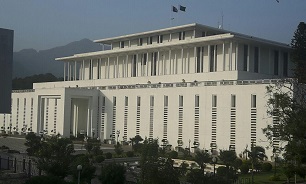Pakistan former Presidents, an overview
 President of Pakistan is a ceremonial figurehead and considered as the symbol of the federation.
President of Pakistan is a ceremonial figurehead and considered as the symbol of the federation.
After the 18th amendment to the constitution of Pakistan, the amended executive powers vested to the office of the President in the constitution of Pakistan after 1973 was surrendered by the former President of Pakistan Asif Zardari to the Prime Minister of Pakistan who is officially the representative of the Parliament and is accountable by the Parliament.
Since the promulgation of the first constitution of Pakistan in 1956, Pakistan has elected 12 Presidents to date. Out of 12 Presidents, seven were democratically elected and four were the military dictators cum Presidents.
Pakistan peoples Party is the only Party who had succeeded in electing four Presidents.
Iskander Mirza served as the last Governor-General of Pakistan and became its first president after the 1956 Constitution was promulgated, which established a republic. He took oath of the office of the President on 23rd March 1956. He was deposed on 27 October 1958 in a military coup by General Ayub Khan.
General Ayub Khan took control over the country after the 27 October 1958 military coup. He led Pakistan into the 1965 war against India. Ayub resigned on 25 March 1969 under pressure from opposition and handed over power to General Yahya Khan.
General Agha Muhammad Yahya Khan became 3rd President of Pakistan after the resignation of Ayub Khan on 25 March 1969. He resigned on 20 December 1971 after Pakistan's defeat to Bangladesh in the 1971 war.
Zulfikar Ali Bhutto the chairmen of Pakistan Peoples Party (PPP) became 4th President of Pakistan and had served at the office for the smallest term of almost one and a half year from 20 December 1971 to 13 August 1973. Bhutto resigned as president to become the Prime Minister after the 1973 Constitution was promulgated, which established a parliamentary system of government.
Fazal Ilahi Chaudhry became 5th President of Pakistan on 14 August 1973. He was the constitutional president, whose authority was exercised by Prime Minister Zulfikar Ali Bhutto. Chaudhry resigned on 16 September 1978 and handed over the presidency to General Zia.
General Muhammad Zia-ul-Haq served as 6th President of Pakistan after he took de facto control over the country by leading the 1977 military coup. He served as the Chief Martial Law Administrator until 1979. He was killed in a plane crash, becoming the only president to die in office on 17 August 1988.
Ghulam Ishaq Khan became 7th President of Pakistan on 17 August 1988 after Zia’s death. He dismissed the government of Prime Minister Benazir Bhutto in 1990. He again attempted to dismiss Nawaz Sharif government in 1993, but the Supreme Court overturned the president's decision. Khan eventually resigned, along with Sharif on 18 July 1993 in an agreement brokered by the Armed Forces.
Sardar Farooq Ahmed Khan Leghari was elected as 8th President of Pakistan on 14 November 1993, after the resignation of Ghulam Ishaq Khan. He dismissed the government of Prime Minister Benazir Bhutto in 1995. Afterwards, Leghari clashed with new Prime Minister Nawaz Sharif, and he finally resigned after being forced by the conservatives and persuaded by the Armed Forces on 2 December 1997.
Muhammad Rafiq Tarar of Pakistan Muslim League (N) served as 9th President of Pakistan after being elected by the parliament on 1 January 1998. Tarar was the constitutional president, whose authority was exercised by Prime Minister Nawaz Sharif. Tarar resigned on 20 June 2001.
General Pervez Musharraf took de facto control over the country by leading the 1999 Pakistani coup d'état. He served as the Chief Executive until 2002. He served as 10th President of Pakistan. He resigned the presidency on 18 August 2008 to avoid impeachment.
Asif Ali Zardari Chairman of Pakistan peoples Party (PPP) became 11th President of Pakistan on 9 September 2008. He was elected after Musharraf's resignation in 2008. The passage of the 18th Amendment in 2010 reduced his vast presidential powers to that of a ceremonial figurehead. He served till 8 September 2013 and left the office after completing his five years tenure.
Mamnoon Hussain of Pakistan Muslim League (N) became 12th President of on 9 September 2013. His five years tenure will expire on September 8th 2018.
On September 4, Dr Arif Alvi of Pakistan of Tehreek-i-Insaf (PTI) was elected as the 13th President of Pakistan by two houses of Parliament and the four provincial assemblies. He secured more than 54% of the Electoral College and defeating opposing candidates Maulana Fazl-ur-Rehman and Aitzaz Ahsan. He is expected to take of his office on 9th September 2018.
Message end/
